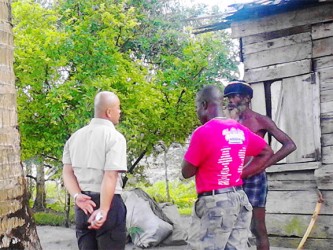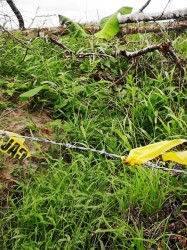A confrontation appears to be brewing at Timehri between residents who have for years utilized land in the area for farming and who may be on the verge of losing both their farms and their homes, and a group of people purporting to represent the interests of the proposed new international airport.
The issue is not about supporting the expansion of the existing airport. It is a matter of determining just what is to be done to stop poor, ordinary Guyanese, who have farmed these lands for a living for years from being uprooted and offered no real options as far as their future is concerned.
The farms at Timehri are substantial enterprises. They produce large quantities of fruits, vegetables and ground provisions. People, families, have built their lives and their livelihoods around these economic ventures and they are altogether deserving of protection.

When the issue of planned relocation and suitable compensation is raised no one seems to know what lies ahead.
Last week, some of the farmers were in a sombre mood. Some of them had already had crops destroyed by people purportedly working for the Chinese company expanding the airport. One of the group suggested that what was happening could not occur without the tacit approval of the Guyana authorities.
Patrick Gray is one of the affected farmers. He is a graduate of Port Mourant Training Centre and a former GuySuCo employee. Gray’s most recent job was refueling airplanes at Timehri. After that he dedicated his life to farming. He has been at his present location for 11 of the 20 years that he has been a farmer.
Gray is self-sufficient in fruit, vegetables and ground provision. A dedicated farmer who has done well, he is a source of food and an asset to the local farming community.
Gray said that for some time now he has had to endure sudden and dramatic invasions of his farm by groups of people who indiscriminately destroy his crops. “I have to prepare myself every day to hear when the machines coming to destroy my things. And I does got to be right there. Sometimes I have to get help to take it out fast enough so not to let my crops go down wastefully,” he said. “I am surrounded with stress because I can’t do nothing else to earn.”
The encounters with the people who destroy his crops have also affected patronage. “People not coming around anymore,” he said.

There is evidence of the damage done to his farm. Plantain suckers and sweet potato planted close to the now dried out creek that used to provide water have been dug up. Several beds of bora, boulanger, ginger, okra and cucumber have been destroyed.
Gray said he managed to reap his last crop of peanuts before the wreckers got to them. He spoke of “the Chinese men” who, he said, ate the peanuts even as he reaped them.
He pointed to an area where he said he had planted carilla, spinach and pak choy. “Two beds that I transplanted and had been coming along. All of that got erased,” he said, adding that he had managed to reap some wiri wiri pepper.
Then he gestured to a bearing lemon tree. “It has been there for five or six years. They have not reached there yet,” he said.
There were other signs of life on the farm – five to six bearing papaw trees, soursop plants and coconuts.
There is an air of tiredness about Gray, but he sees no option but to press on. When the issue of compensation comes up there is a quizzical expression on his face. “Nobody ain’t come and tell me nothing. It’s just a man who is an authority from the airport, or so he claim he is. I don’t know his portfolio and he just come and tell me you gotta move,” he said.
Gray recalled an occasion when Transport Minister Robeson Benn had visited the area. A crowd had gathered some distance away from his place to meet with the officials. “I was afraid to leave my place and go,” he said.
As far as he is aware the people who had gathered for the meeting were told that they would be given $10,000 to cover the cost of putting their materials or their houses on a truck and carting them off. He wondered aloud as to whether the concrete houses in the area would be dismantled too.
Gray said that two men, a Chinese national and a Guyanese continue to haunt him. “The two of them are always walking around,” he said. He said too that some time ago four men armed with cutlasses invaded his farm.
“It sounded like wild hogs at the bottom and we came out and see them with cutlasses. No one from Guyana was there with them so I turn them back. Then afterwards they came with the police,” he added.
Gray feels a sense of being betrayed in his own country. Foreign nationals ordering him off land he has cultivated for at least two decades is more than he can bear, he said. So too is the destruction of food crops in a country that professes a commitment to agriculture and talks incessantly about food security. He said he has nowhere else to go and appears to have dug in for the long haul.




